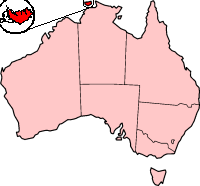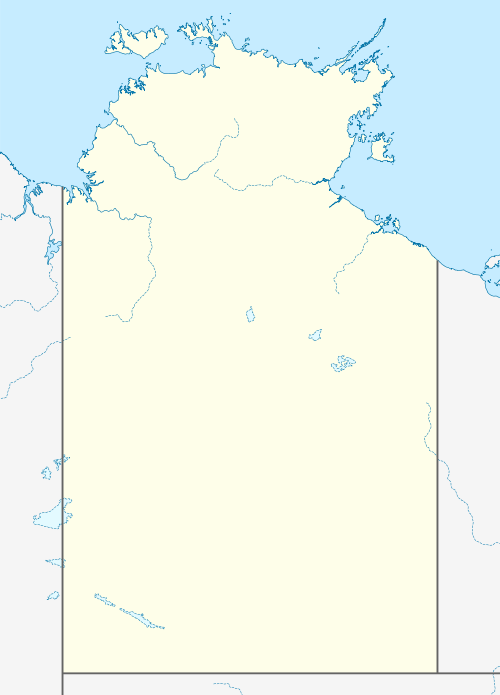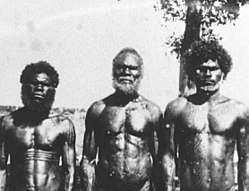Bathurst Island (Northern Territory)
 Tiwi Islands | |
 Bathurst Bathurst Island (Northern Territory of Australia) | |
| Geography | |
|---|---|
| Location | Timor Sea |
| Coordinates | 11°35′S 130°18′E / 11.583°S 130.300°E |
| Archipelago | Tiwi Islands |
| Major islands | Bathurst, Buchanan |
| Area | 2,600 km2 (1,000 sq mi) |
| Administration | |
|
Australia | |
| Territory | Northern Territory |
| Largest settlement | Wurrumiyanga (pop. 1582) |
| Demographics | |
| Population | ca. 1640 |
| Pop. density | 0.63 /km2 (1.63 /sq mi) |
Bathurst Island (2,600 km2 or 1,000 sq mi,[1] 11°35′S 130°18′E / 11.583°S 130.300°E) is one of the Tiwi Islands in the Northern Territory off the northern coast of Australia along with Melville Island.
Description
The largest settlement on Bathurst is Wurrumiyanga (known as Nguiu until 2010), in the south-east, with a population of around 1,450.[2] Located on the south east corner of Bathurst Island, Wurrumiyanga is approximately 70 km (43 mi) north of Darwin. The second largest settlement is Wurakuwu, pop. 50, 60 km (37 mi) northwest of Wurrumiyanga. The third settlement on the island is a small family outstation called 4 Mile Camp, about 6 km (4 mi) west of Wurrumiyanga.
History

The island was named after Henry Bathurst, 3rd Earl Bathurst, who, like Viscount Melville, is also commemorated by a Canadian island. From 1910 to 1938 the island was the site of the Roman Catholic mission of Francis Xavier Gsell, known as the "Bishop with 150 wives" for his practice of "buying" girls betrothed to older men, thus making it possible for them to marry men of their own age.[3]
During the Bombing of Darwin the first wave of 188 Japanese planes was spotted by Father John McGrath, a Catholic priest conducting missionary work at the mission station on Bathurst Island. Father McGrath sent a message on the radio saying "An unusually large air formation bearing down on us from the northwest". Nearly everyone ignored this, though it was on the most popular radio station. About an hour later there were roughly 100 people dead, but the people who followed his instruction all survived. Darwin received both this and another warning at least twice by radio, no later than 9:37 a.m. However, 11 US P-40E Kittyhawk fighters and an LB-30 Liberator had just departed Darwin and the Australian duty officer assumed this was the same formation. The warnings were not acted upon so, as at Pearl Harbor two months earlier, Darwin's final chance to make last-minute preparations for the impending raid slipped away.
Bathurst Island was depicted as Mission Island in the 2008 Baz Luhrmann film Australia. In the film, the mixed-race boy Nullah is kept at the mission on the island for the two months preceding the Bombing of Darwin. The mission is bombed in the raid, and the children hide from Japanese troops until their rescue. The presence of Japanese troops on the island is entirely fictional, as no such landing by the Japanese was made during World War II. There was only a Japanese plane that crashed on the island where the pilot was caught and handed over to the correct authorities.
Notes and references
- ↑ "Size change". Encyclopædia Britannica entry on Bathurst island supporting size.
- ↑ "Nguiu". Tiwi Islands Local Government website. Archived from the original on 2004-12-09.
- ↑ J. Franklin, The missionary with 150 wives, Quadrant 56 (7/8) (July 2012), 30-32.
External links
- Tiwi Land Council
- Tiwi Art
- Encyclopædia Britannica entry on Bathurst island
- Walkabout entry on Bathurst Island